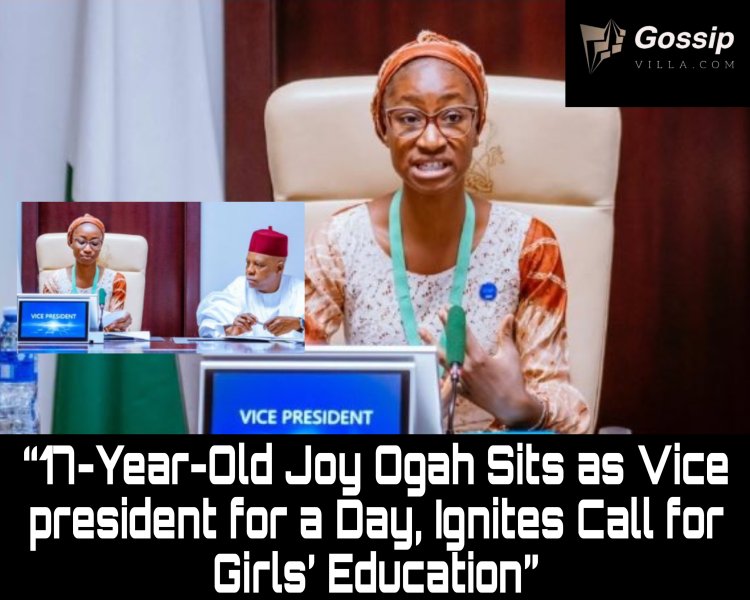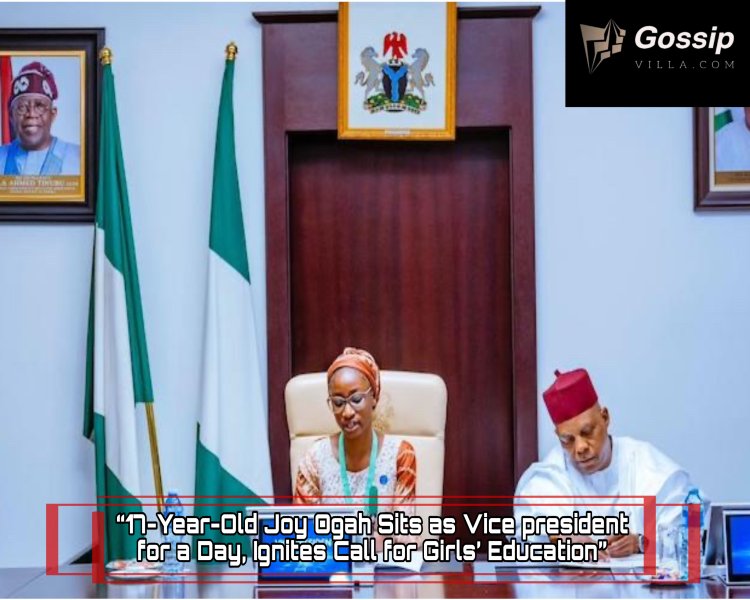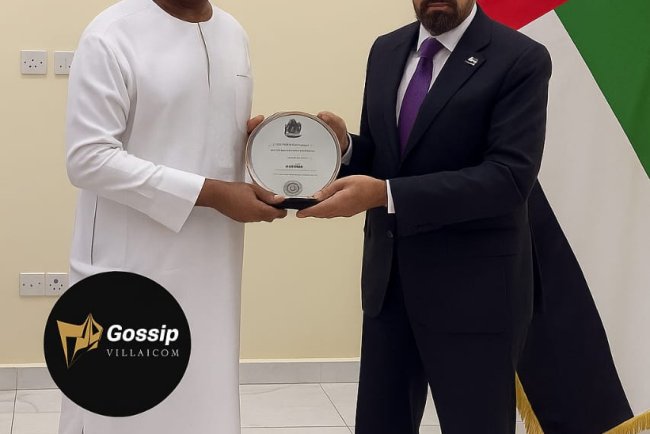17-Year-Old Joy Ogah Sits as Vice President for a Day, Ignites Call for Girls’ Education
Nigerian teen Joy Ogah took over VP Kashim Shettima’s seat for a day, using the platform to champion girls’ rights and education across Nigeria.

“17-Year-Old Joy Ogah Sits as Vice President for a Day, Ignites Call for Girls’ Education”
In a powerful display of youth empowerment and advocacy, 17-year-old Nigerian teenager Joy Ogah made headlines on October 20, 2025, when she symbolically assumed the role of Vice President for a day. Stepping into the prestigious seat of Vice President Kashim Shettima at the Presidential Villa in Abuja, Ogah seized the moment to deliver a stirring call for the rights and education of girls across Nigeria. This symbolic gesture, organized in collaboration with PLAN International, not only highlighted the untapped potential of young voices but also underscored the urgent need to address gender disparities in education. As Nigeria grapples with over 10.5 million out-of-school children more than 60% of whom are girls Ogah’s bold address from the VP’s chair serves as a beacon of hope and a rallying cry for systemic change.
The event
The event unfolded during a high-profile meeting between Vice President Shettima and a delegation from PLAN International, an international NGO dedicated to advancing children’s rights and equality for girls. Led by Helen Mfonobong Idiong, the Director of Programme, Quality, and Innovation, the delegation discussed strategies to combat the barriers preventing girls from accessing quality education in Nigeria. Idiong emphasized that girls worldwide, including those in Nigeria, face multifaceted crises ranging from poverty and early marriage to insecurity and inadequate infrastructure. In response, Shettima reaffirmed President Bola Tinubu’s administration’s commitment to girl-child education, spotlighting initiatives like the national school feeding program, which has been instrumental in boosting enrollment and retention rates, particularly among girls.
But the true highlight came when Shettima, in a gesture of profound mentorship, invited Ogah to “take over” his seat. “Kindly sit down, my dear daughter. Let no one tell you that you can’t make it to this chair. Pursue your dreams, and believe me, Mr. President will continue to support you and all girl children to succeed,” he told her, as captured in official State House records. Seated confidently in the Vice President’s chair, the young advocate from Abuja addressed the room and by extension, the nation with eloquence and urgency. Her words echoed the struggles of millions, transforming a ceremonial moment into a platform for real advocacy.

Joy Ogah’s speech : A Voice for Girls
Ogah’s speech was a masterclass in passionate oratory. She began by expressing profound gratitude for the opportunity to represent “millions of Nigerian girls who deserve a voice.” Drawing on stark statistics, she highlighted that 10.5 million children in Nigeria are out of school, with girls comprising over 60% of that figure a crisis exacerbated by factors like economic hardship, cultural biases, and conflict in regions such as the Northeast. “We must invest in education that is safe and inclusive for every child in Nigeria,” she declared. “When girls are protected, peace becomes possible.”
Her demands were specific and actionable, reflecting a deep understanding of the barriers girls face. Ogah called for the provision of free sanitary products in schools to combat period poverty, which forces many girls to miss up to 20% of school days annually. She advocated for improved access to clean water, sanitation facilities, and nutrition programs, noting that well-nourished children perform better academically and are less likely to drop out. “Every girl deserves a classroom, a choice, dignity, and not silence,” she asserted, urging policymakers to embed these priorities into budgets, laws, and national conversations. She concluded with a poignant reminder: “I may be the Vice President for a day, but the struggles I represent cannot end in a day. They must continue in our policies, our classrooms, our conversations, and our budgets.”
This “Vice President for a Day” initiative is part of a broader global movement tied to the International Day of the Girl Child, observed annually on October 11. PLAN International has a track record of such symbolic takeovers; earlier in 2024, a similar event saw a girl-child assume the Speaker’s seat in Nigeria’s House of Representatives, leading to the removal of VAT on sanitary pads and diapers a direct policy win for menstrual hygiene. Ogah’s moment builds on this momentum, amplifying calls for gender-inclusive leadership. Vice President Shettima praised her poise, describing First Lady Oluremi Tinubu as a living testament to what an empowered girl-child can achieve. He recalled her senatorial tenure, where she championed education debates, and positioned her as a role model for the next generation.
The significance of Ogah’s advocacy
This extends far beyond the Presidential Villa. In Nigeria, where the female literacy rate lags behind males by nearly 20 percentage points, initiatives like this are vital for fostering a culture of inclusion. Educating girls yields multiplier effects: studies from UNESCO show that each additional year of schooling for girls can increase their future earnings by 10-20%, reduce child marriage rates, and contribute to lower infant mortality. Moreover, empowered girls are more likely to become leaders, innovators, and change-makers, breaking cycles of poverty in their communities.
A Call to Action
Ogah’s story is a reminder that true leadership isn’t confined to age or title it’s about vision and courage. As Nigeria strides toward its 2030 Sustainable Development Goals, particularly Goal 4 on quality education and Goal 5 on gender equality, voices like hers must remain at the forefront. The Tinubu administration’s pledge to collaborate with organizations like PLAN International signals promising partnerships, but implementation will be key. From free sanitary pads to fortified school meals, turning rhetoric into reality could unlock the potential of millions of Joy Ogahs waiting in the wings.
Conclusion
In the end, Joy Ogah didn’t just occupy a seat for 24 hours; she planted seeds of possibility. Her message that investing in girls is investing in Nigeria’s future resonates long after the meeting adjourned. As she stepped down from the VP’s chair, one thing was clear: this teenager isn’t just advocating for change; she’s embodying it.
What's Your Reaction?




















